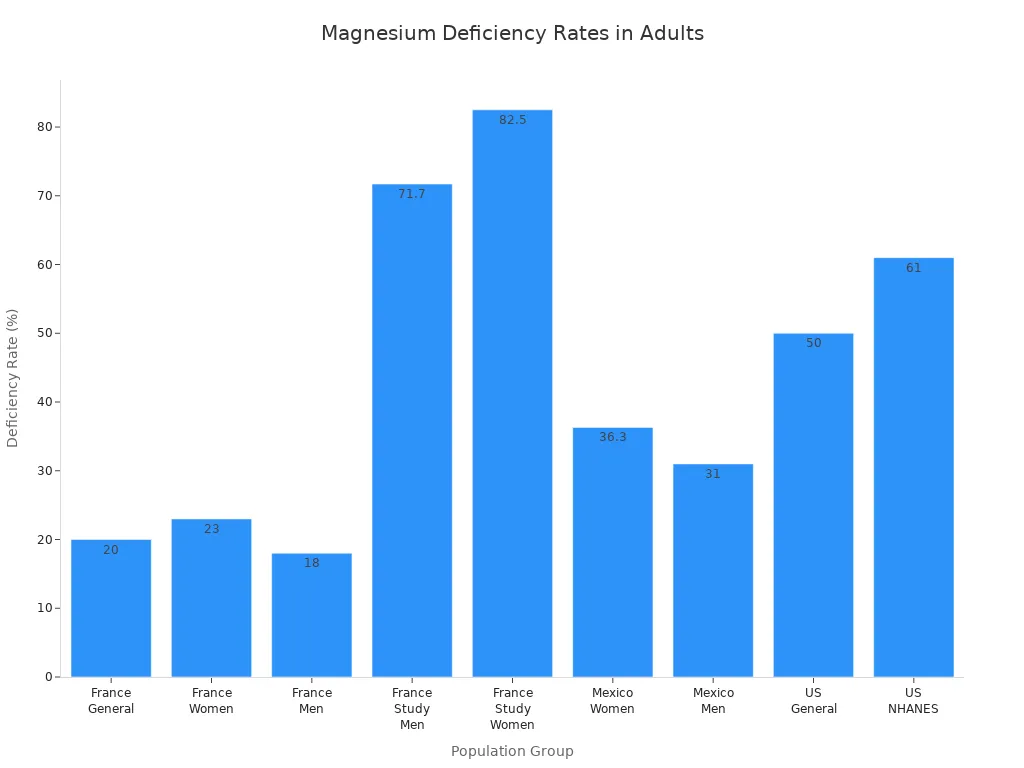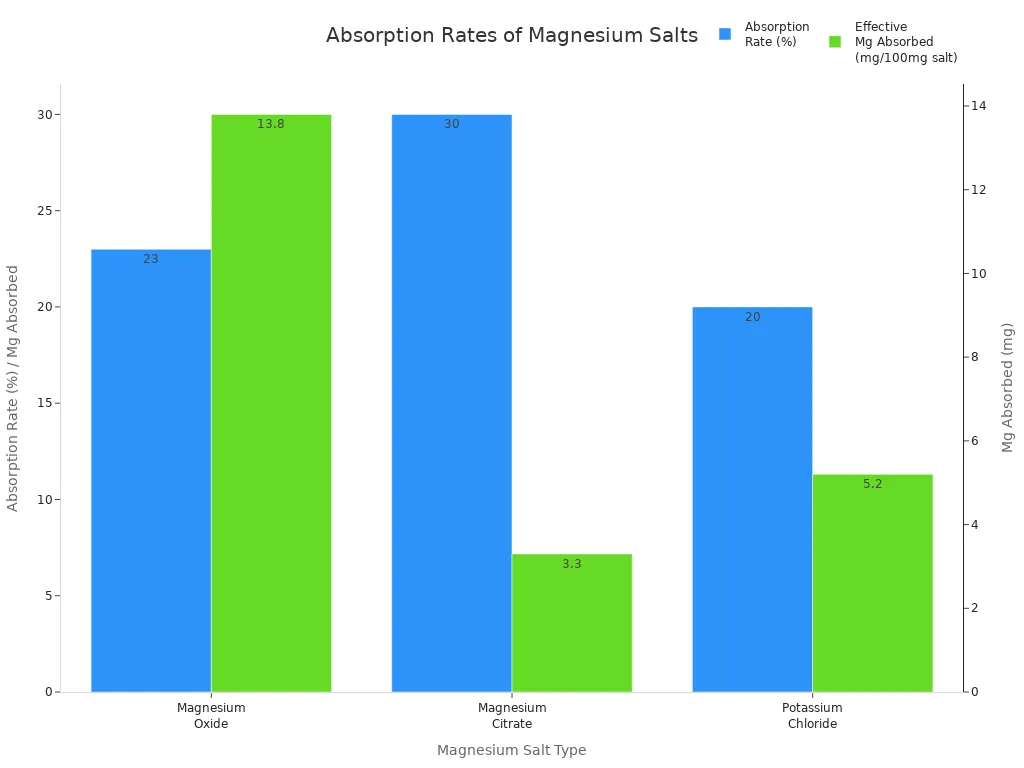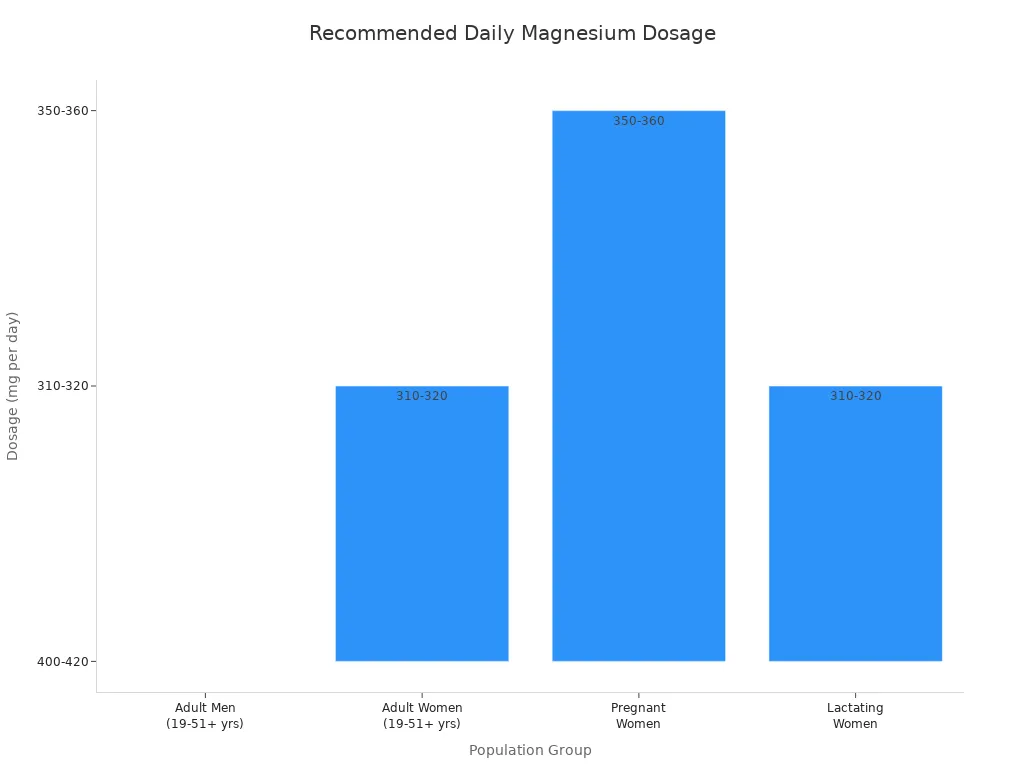How Health Benefits of Magnesium Potassium Citrate Support You
Table of Contents

You can support your overall wellness with magnesium potassium citrate. This dual-action dietary supplement delivers important health benefits for your muscles, nerves, bones, heart, and kidneys. Magnesium and potassium work together in your body. Many adults lack enough magnesium or potassium, which can impact health.


- Magnesium helps muscle contraction, nerve function, and bone strength.
- Potassium supports heart health, blood pressure, and kidney function.
Supplements like the magnesium-potassium combo may improve your well-being if your diet does not provide enough. You can explore how these nutrients fit into your routine for better health.
Health Benefits Overview

Muscle and Nerve Support
You rely on magnesium and potassium every day for strong muscles and healthy nerves. These minerals help your body send signals between your brain and muscles, allowing you to move, react, and stay active. Magnesium supports the balance of electrolytes and helps your muscles contract and relax. Potassium maintains the electrical gradient across muscle cells, which is essential for nerve impulses and muscle movement.
Tip: If you feel muscle cramps or weakness, your diet may lack enough magnesium or potassium.
The sodium-potassium pump uses energy to move sodium and potassium in and out of cells. This process keeps your nerves firing and muscles working. Magnesium works with potassium to regulate muscle function and prevent cramps. You need both minerals for proper carbohydrate use and muscle protein synthesis, which supports muscle health.
Clinical trials show that magnesium supplementation can improve muscle strength and reduce pain. For example, studies found that magnesium citrate helped people with low back pain feel better and move more easily. While direct research on magnesium potassium citrate for muscle health is limited, you can benefit from the combined effects of these minerals.
| Component | Role in Muscle & Nerve Health |
|---|---|
| Potassium | Maintains electrical gradient, supports nerve and muscle function, aids protein synthesis |
| Magnesium | Regulates muscle contraction and relaxation, supports electrolyte balance |
| Sodium-Potassium Pump | Maintains ionic gradients for nerve impulse transmission and muscle contraction |
| Ion Channels | Enable action potentials and electrical signaling |
Bone and Heart Health
You protect your bones and heart by getting enough magnesium and potassium. These minerals help keep your bones strong and your heart beating steadily. Potassium citrate reduces calcium loss in urine, which may help maintain bone density and lower the risk of osteoporosis. Magnesium supports bone formation and helps your body use calcium properly.
- Potassium citrate decreases bone resorption markers and increases bone formation markers.
- Magnesium supplementation in postmenopausal women increases bone density and lowers fracture risk.
You also support heart health by including magnesium and potassium in your diet. Magnesium helps regulate electrolytes like calcium and sodium, which keeps your heart rhythm steady. Potassium relaxes blood vessels and lowers blood pressure. Magnesium helps transport potassium into heart cells, which is vital for a healthy heart.
Note: Low potassium levels can lead to stiff arteries and higher cardiovascular risk.
Clinical studies show that magnesium and potassium together can lower blood pressure, improve blood flow, and reduce the risk of arrhythmias. Magnesium acts as a natural calcium channel blocker and improves the effectiveness of heart medications. You can support a healthy heart by eating a healthy diet rich in these minerals.
Immune and Energy Boost
You boost your immune system and energy levels with magnesium and potassium. Magnesium helps your body fight infections and repair cells. It supports enzymes that help immune cells grow and work properly. Magnesium also helps regulate inflammation and antioxidant defenses, protecting you from chronic diseases.
- Magnesium deficiency increases oxidative stress and lowers antioxidant defenses.
- Magnesium supports DNA repair, T cell activation, and antibody production.
- Magnesium helps your body produce ATP, the main energy source for cells.
Potassium supports energy metabolism and helps maintain fluid balance, which is important for overall health. If you feel tired or fatigued, you may need more magnesium in your diet. Magnesium citrate is well absorbed and can help reduce fatigue caused by deficiency.
Tip: Eating foods rich in magnesium and potassium, such as leafy greens, nuts, and bananas, helps you stay energized and healthy.
Studies show that low magnesium levels are linked to higher inflammation and worse outcomes in illnesses like COVID-19. Magnesium helps your body recover and maintain energy during stress or illness. You can support your immune system and energy by making sure your diet provides enough magnesium and potassium.
What Is Magnesium Potassium Citrate
Magnesium and Potassium Roles
You need magnesium and potassium every day for your body to work well. Magnesium acts as a helper for over 300 enzymes. These enzymes help you make energy, build proteins, and keep your muscles and nerves working. Magnesium helps your body use ATP, which is the main energy source for your cells. It also helps your muscles relax by moving calcium back into storage after each contraction. Magnesium keeps your heart beating in a steady rhythm and helps your bones stay strong.
Potassium is the most common mineral inside your cells after magnesium. You use potassium to keep your muscles and nerves working. Potassium helps move nutrients into your cells and waste out. It also helps control your heartbeat and keeps your blood pressure in a healthy range. You get potassium from potassium-rich foods like bananas and potatoes. You also need magnesium-rich foods such as spinach and almonds for good nutrition.
Tip: If you do not get enough magnesium or dietary potassium from your diet, you may feel tired or weak. Supplements can help fill these gaps.
- Magnesium supports:
- Energy production
- Muscle and nerve function
- Bone health
- Heart rhythm
- Insulin action
- Potassium supports:
- Muscle contraction
- Nerve signals
- Fluid balance
- Blood pressure
How It Differs from Other Forms
You may wonder how magnesium potassium citrate compares to other supplements. Magnesium potassium citrate combines both minerals in a form your body can absorb well. This makes it easier for you to get the benefits of both magnesium and potassium at the same time.
Magnesium citrate absorbs better than magnesium oxide. Even though magnesium oxide has more magnesium by weight, your body takes in more from citrate because it dissolves better. Potassium chloride, another common form, absorbs at a moderate rate. The table below shows how these forms compare:
| Magnesium Salt | % Elemental Magnesium | Approximate Absorption Rate | Effective Magnesium Absorbed per 100 mg Salt |
|---|---|---|---|
| Magnesium Oxide | 60% | ~23% | ~13.8 mg |
| Magnesium Citrate | 11% | ~30% | ~3.3 mg |
| Potassium Chloride | 26% | ~20% | ~5.2 mg |

You can choose magnesium potassium citrate if you want a supplement that is gentle on your stomach and easy to absorb. Many people use these supplements when their diet does not provide enough minerals. You can also support your health by eating more potassium-rich foods and magnesium-rich foods.
Magnesium and Potassium for Wellness

Blood Pressure and Blood Sugar
You support your cardiovascular health by maintaining healthy blood pressure with the right magnesium and potassium intake. Potassium plays a key role in keeping your blood pressure in a healthy range. When you increase your potassium intake, you help lower blood pressure, especially if your diet is low in potassium. Clinical trials show that potassium supplementation can reduce both systolic and diastolic blood pressure. If you lower your potassium intake, your blood pressure rises. Magnesium does not show a strong effect on blood pressure in most studies, but you still need it for overall health.
- Potassium intake helps maintain healthy blood pressure.
- Magnesium intake supports your heart and metabolic health.
Magnesium also helps regulate blood sugar. If you have diabetes or insulin resistance, you may benefit from magnesium supplementation. Magnesium improves insulin sensitivity and lowers fasting and post-meal blood sugar levels. Many people with diabetes have low magnesium, so correcting this deficiency can help. Magnesium citrate absorbs well and may give better results. You should talk to your doctor before starting magnesium supplements if you have diabetes.
Sleep and Mood
You can improve your sleep and mood by getting enough magnesium. Magnesium helps your body relax and supports deep, restful sleep. It increases GABA, a neurotransmitter that calms your nervous system. If you do not get enough magnesium, you may feel anxious, have trouble sleeping, or notice mood changes. Magnesium activates your parasympathetic nervous system, which helps you unwind and sleep better.
Tip: Eating foods rich in magnesium, such as leafy greens and nuts, can help you feel more relaxed and improve your sleep quality.
Magnesium also regulates neurotransmitters like serotonin and dopamine, which are important for mood stabilization. Clinical trials show that magnesium supplementation can reduce stress and improve emotional resilience. Potassium is found in many foods that support health, but research does not show a direct link between potassium and sleep or mood.
Kidney Stone Prevention
You protect your kidneys by using magnesium and potassium citrate. Magnesium binds oxalate in your gut and urine, which helps prevent kidney stone formation. Potassium citrate increases urinary citrate and pH, making it harder for stones to form. The combination of magnesium and potassium citrate works together to reduce stone recurrence.
A clinical study found that patients taking potassium-magnesium citrate had a much lower risk of new kidney stones compared to those taking a placebo. Over three years, only 12.9% of patients on the supplement developed new stones, while 63.6% of those on placebo did. Citrate therapy also helps shrink existing stones and reduces the need for retreatment.
| Mineral | How It Helps Prevent Stones |
|---|---|
| Magnesium | Binds oxalate, increases urinary citrate |
| Potassium citrate | Raises urinary citrate and pH |
You can support your kidney health and lower your risk of stones by making sure you get enough magnesium and potassium.
Safety and Usage
Who Should Use Caution
You should always think about your health before starting magnesium or potassium supplements. Some people have a higher risk of side effects or complications. If you have kidney disease, your body cannot remove extra magnesium or potassium well. This can lead to dangerous levels in your blood. People with heart block, myasthenia gravis, or blood clotting problems also need to be careful. Children, older adults, and pregnant or breastfeeding women should only use these supplements under medical advice.
Here is a table to help you see who should use caution:
| Population Group | Reason for Caution |
|---|---|
| Kidney Disease | Risk of magnesium or potassium buildup |
| Heart Block | High doses can worsen heart problems |
| Myasthenia Gravis | Magnesium can weaken muscles |
| Blood Clotting Disorders | Magnesium may slow blood clotting |
| Diabetes | Risk of deficiency and complications |
| Elderly | Higher risk due to other health issues |
| Pregnant/Breastfeeding Women | Risk of overdose and side effects |
| Children | Safe doses vary by age |
You should also watch for side effects like nausea, diarrhea, or stomach pain. Allergic reactions such as rash, swelling, or trouble breathing need quick medical help.
Dosage Tips
You need the right amount of magnesium and potassium for good health. Too much can cause problems. Health experts recommend these daily amounts for adults:
| Group | Magnesium (mg) | Potassium (mg) |
|---|---|---|
| Adult Men (19-51+) | 400-420 | 3,400 |
| Adult Women (19-51+) | 310-320 | 2,600 |
| Pregnant Women | 350-360 | 2,900 |
| Breastfeeding Women | 310-320 | 2,800 |

You should not take more than 350 mg of magnesium from supplements each day unless your doctor says it is safe. Most people get enough potassium from food, so potassium supplements are not needed unless your doctor recommends them. Always follow the instructions on the label. Mixing your supplement with water or juice and taking it after meals may help reduce stomach upset.
When to Consult a Doctor
You should talk to your doctor before starting magnesium or potassium supplements if you:
- Have kidney, heart, or adrenal gland problems.
- Take medicines for blood pressure, heart, or kidney issues.
- Are pregnant, breastfeeding, or giving supplements to a child.
- Notice symptoms like muscle weakness, irregular heartbeat, or severe stomach pain.
- Have a history of dehydration or stomach problems.
Note: Some medicines can interact with magnesium or potassium, such as diuretics, antibiotics, and heart drugs. Your doctor can help you avoid harmful effects and choose the right dose.
If you feel dizzy, weak, or have trouble breathing after taking supplements, stop and get medical help right away. Regular blood tests may help your doctor check your magnesium and potassium levels.
You support your health by choosing magnesium potassium citrate. This supplement helps your muscles, bones, and heart. Research shows magnesium and potassium together improve blood pressure, blood sugar, and overall wellness.
Always talk to your healthcare provider before starting new supplements, especially if you have kidney or heart issues.
You can add magnesium-rich foods and potassium-rich foods to your diet for better health. Your personal needs may change how well magnesium potassium citrate works for you.
FAQ
Can you take magnesium potassium citrate every day?
You can take magnesium potassium citrate daily if your doctor says it is safe. Most people use it to fill gaps in their diet. Always follow the label instructions and do not exceed the recommended dose.
What foods are high in magnesium and potassium?
You find magnesium in spinach, almonds, and black beans. Potassium comes from bananas, potatoes, and oranges. Eating a variety of fruits, vegetables, nuts, and beans helps you get enough of both minerals.
Does magnesium potassium citrate help with leg cramps?
Magnesium and potassium support muscle function. If you have leg cramps from low levels, this supplement may help. You should talk to your doctor if cramps continue or worsen.
Are there any side effects?
You may notice mild side effects like stomach upset or diarrhea. Rarely, high doses cause serious problems. > Tip: Stop taking the supplement and call your doctor if you feel weak, dizzy, or have trouble breathing.
Can children use magnesium potassium citrate?
Children should only use this supplement if a doctor recommends it. Safe doses depend on age and health. Never give supplements to children without medical advice.

Poseidon
Master of Nutritional Epidemiology, University of Copenhagen, Herbal Functional Nutrition Researcher
Focus: The scientific application of natural active ingredients such as Tongo Ali, Horny Goat Weed, and Maca to sexual health and metabolic regulation.
Core Focus:
Men: Use a combination of Tongo Ali (an energizing factor) + Maca (an energy reserve) to improve low energy and fluctuating libido.
Women: Use a combination of Horny Goat Weed (a gentle regulator) + Maca (a nutritional synergist) to alleviate low libido and hormonal imbalances.
Stressed/Middle-Aged Adults: This triple-ingredient synergy supports metabolism, physical strength, and intimacy.
Product Concept:
Based on traditional applications and modern research (e.g., Tongo Ali promotes testosterone-enhancing enzyme activity, and icariin provides gentle regulation), we preserve core active ingredients and eschew conceptual packaging—using natural ingredients to address specific needs.
Simply put: I'm a nutritionist who understands "herbal actives." I use scientifically proven ingredients like Tongo Ali, Epimedium, and Maca to help you make "sexual health" and "nutritional support" a daily routine.
